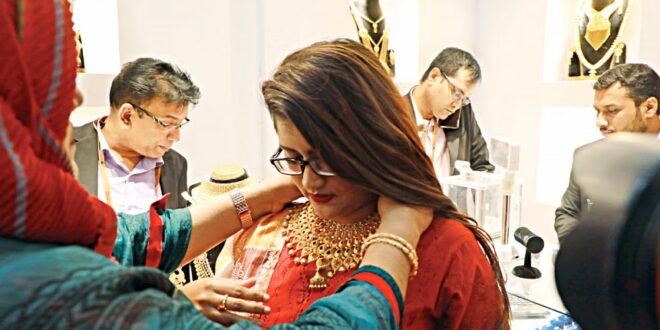The jewellery industry in Bangladesh has apparently remained largely dependent on unauthorised channels for sourcing gold although there is no direct government bar on importing the precious metal.
Industry insiders said the taxes on legally importing gold were high, which was the main reason companies felt more comfortable sourcing gold from unauthorised channels.
Companies source gold by taking advantage of the National Board of Revenue’s (NBR’s) baggage rules and through other informal avenues, they added.
In 2018, the government framed a policy on gold to boost its import, prevent smuggling and ensure greater transparency in its trade.
A year later, Bangladesh Bank (BB) awarded licences to 18 companies and a bank to import gold.
Between 2020 and 2021, the banking regulator approved the import of 306.76 kilogrammes of gold bars to 12 companies, including Diamond World Ltd, LaxmiJewellers Ltd, BDEXgold and Rotno Gold Corner, showed central bank data.
But till now, eight of those companies have imported only 133.37 kg of gold bars despite the huge demand for gold in the local market.
Of them, Diamond World, one of largest jewellery companies, imported 63.5 kg, Riya Jewelers imported 30.45 kg, Aroosa Gold Corporation imported 14 kg, Jarwa House Pvt Ltd imported 11.66 kg and Golden World Jewelers imported 7.82 kg, showed the BB data.
The yearly demand for gold in the local market stood between 20 tonnes and 40 tonnes, according to Gold Policy-2018.
About 80 percent of the demand is still met by smuggled gold, as per industry insiders, causing huge revenue losses for the government every year.
The tax on gold import needs to be reduced, otherwise imports through legal channels will not increase, opined Dewan Aminul Islam Shahin, vice-president of Bangladesh Jeweller’s Association (Bajus).
Reponul Hasan, owner of Jewellery House, which imported 1.50 kg of gold bars, expounded on the high taxbrought on by legal imports.
“We have to pay Tk 2,000 as tax, five percent as customs duties and five percent advance income tax (AIT) for each bhori of imported gold. There is also the cost of insurance,” he told The Daily Star.
On the other hand, there are no such costs when sourcing gold from unofficial channels.
Moreover, another barrier was that banks were now uninterested in opening letters of credit (LC) for gold imports due to the forex reserve crisis, added Hasan.
In August last year, BB indirectly discouraged gold import keeping a 100 percent margin on LC opening for gold.
A senior official of the central bank told The Daily Star that the banking regulator discouraged banks from importing the luxury metal in light of the present forex crisis.
A gold importer, seeking anonymity, said they were keener on collecting gold by making use of the NBR’s baggage rules.
“When Bangladeshi expatriates come to the country, they can bring gold as per the baggage rules of the NBR and we collect this gold from them,” the importer said.
Earlier, a passenger could bring up to 234 grammes of gold paying duties under the NBR’s baggage rules. However, if the amount was limited to 100 grammes, no duty had to be paid.
However, under a new Baggage Rule-2023 introduced last fiscal year, a passenger can bring a maximum of 116 grammes of gold and must pay Tk 40,000 in taxes for it. This is double that for the previous maximum amount.
Currently, the price of each bhori (11.664 grammes) of 22-carat gold is Tk 1,01,244 according to Bajus.
Industry insiders said the price would decrease if there was greater transparency in the sector.
AB Mirza Azizul Islam, former adviser to a caretaker government, told The Daily Star that jewellers found it easier to source gold from informal avenues compared to legal channels. Hence, legal imports of gold had not increased.
He said the government would have to take strict measures to stop gold smuggling.
Khondaker Golam Moazzem, research director of the Centre for Policy Dialogue, said the purpose of allowing gold imports was to develop an industry through formal channels.
It is objectively positive and that is why the government announced the gold policy, he added.
However, a barrier to the policy’s implementation is the fact that the government has not taken appropriate steps to curb the illegal arrival of gold. As such, it is difficult to achieve the goals of the gold policy, he added.
(TDS)
 Welcome to Business Outlook
Welcome to Business Outlook




